(November 24, 2024) In 1981, with $250 in seed capital, Nandan Nilekani joined six others around a borrowed table to launch a company. Over the years, Infosys became India’s first globally recognized IT giant, symbolizing the country’s emergence as a global technology leader. For Nilekani, however, Infosys was just the beginning.
From leading Aadhaar, the world’s largest biometric identity program, to driving digital initiatives like UPI and India Stack, the Global Indian has been instrumental in transforming India’s infrastructure. His work spans education, through EkStep; artificial intelligence, with Adbhut India; to addressing systemic challenges in water, urban governance, and inclusion. Nandan and Rohini Nilekani are also among India’s top philanthropists, and have pledged half their wealth to the Giving Pledge. Recently, Nilekani was featured in TIME’s 100 Top Voices in AI 2024.
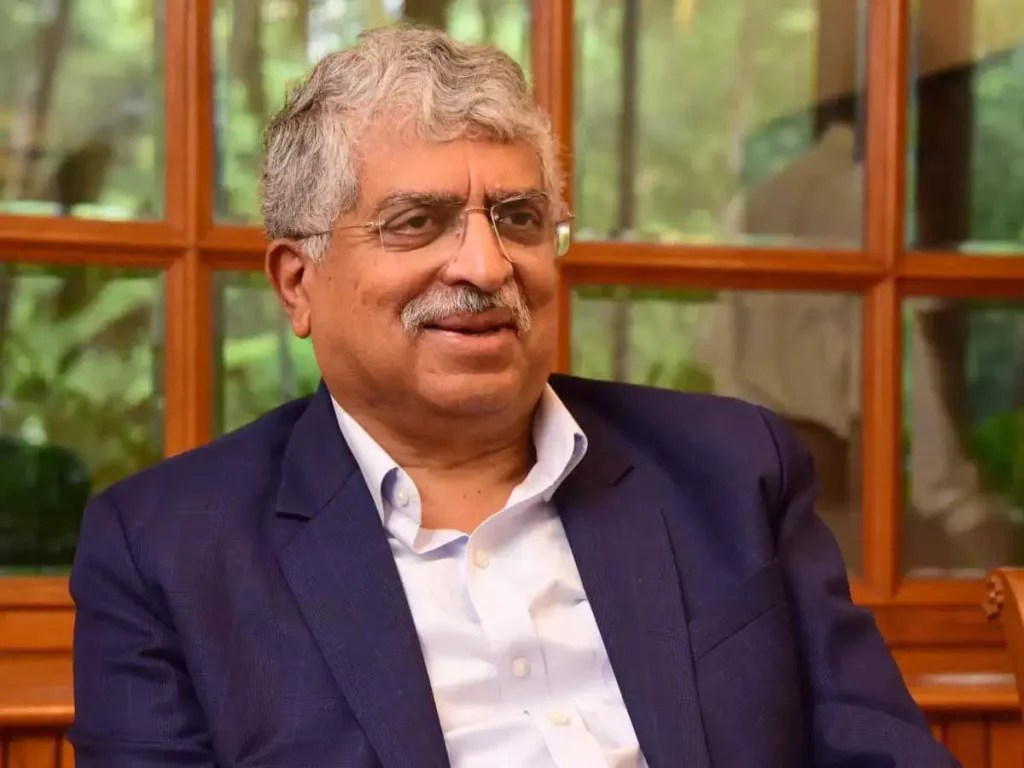
Infosys: Making India a global IT leader
Founded in 1981, Infosys came into being at a time when the idea of a globally competitive Indian technology company was almost unimaginable. Co-founded by Nandan Nilekani, N.R. Narayana Murthy, and five others, the company began in a small Pune apartment with just $250 in seed funding. The challenges of launching a software services firm in India’s tightly regulated economy were immense, requiring innovation, persistence, and a long-term vision.
In those early years, Nilekani’s ability to build relationships was critical. He secured Infosys’ first significant international contract with Data Basics Corporation in the United States in 1983, a deal that marked the company’s entry into the global market. “That deal wasn’t just a win for Infosys—it was proof that Indian companies could deliver world-class solutions,” Nilekani later said.
Infosys set itself apart with its emphasis on ethics and transparency. The company introduced employee stock ownership plans, fostering loyalty and aligning employee interests with its success. In an era when corporate governance in India was opaque, Infosys became a model for accountability and professionalism.
The company’s transformative moment came in 1999 when it became the first Indian firm to list on NASDAQ. This event brought global recognition to Infosys and marked India’s arrival on the international technology stage. “NASDAQ wasn’t just about raising capital,” Nilekani remarked. “It was about demonstrating that Indian companies could thrive on the global stage.”
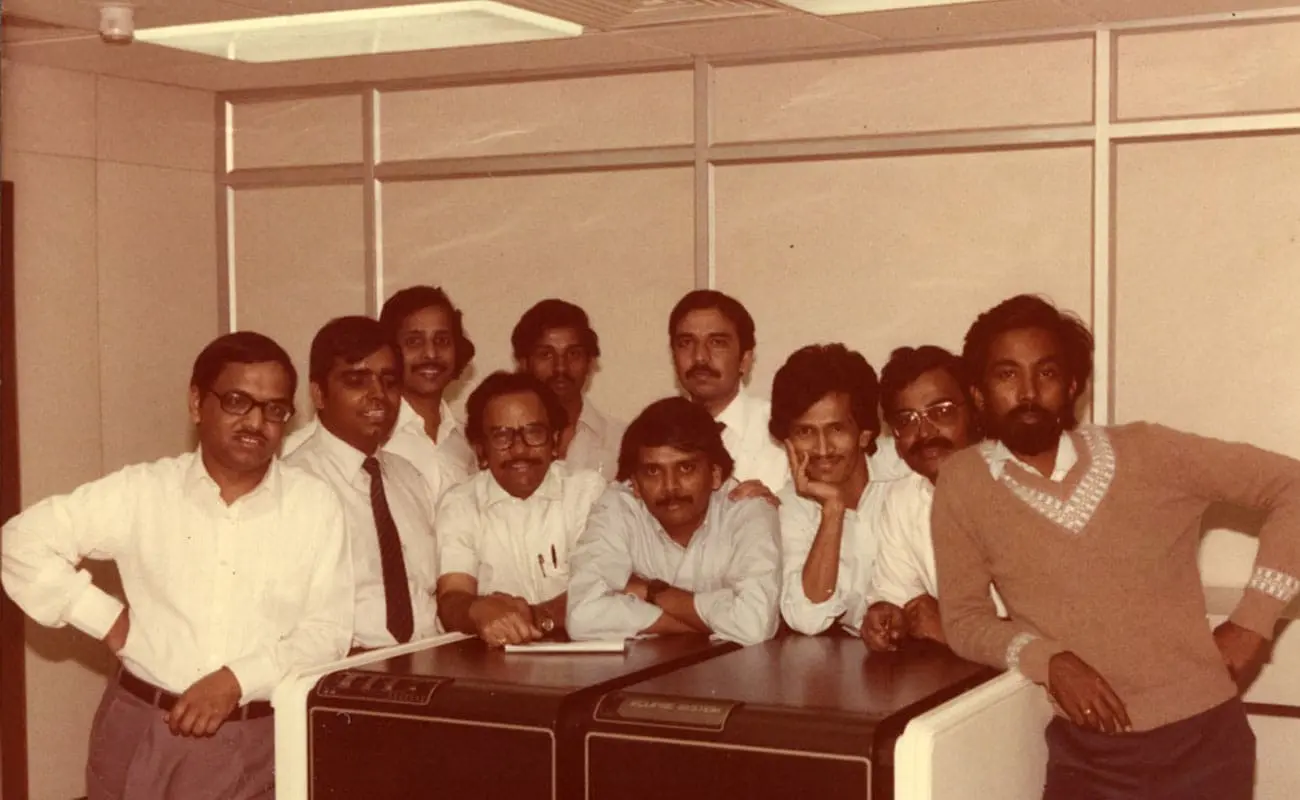
The co-founders of Infosys
Nilekani became Infosys’ CEO in 2002, leading the company through a period of rapid expansion. Under his leadership, Infosys’ revenues grew from $500 million to $3 billion by 2007, and its workforce expanded to over 70,000. Nilekani emphasized scalability and adaptability, ensuring that Infosys could navigate the rapidly evolving global technology landscape.
In 2009, Nilekani left Infosys to take on a new challenge: Aadhaar. However, his association with the company didn’t end there. In 2017, during a leadership crisis, he returned as non-executive chairman, stabilizing the company and reaffirming its founding principles.
Aadhaar: Redefining Governance at Scale
In 2009, Nilekani was appointed chairman of the Unique Identification Authority of India (UIDAI), tasked with creating Aadhaar, a biometric identity system designed to provide every Indian with a unique ID. At the time, millions of Indians lacked formal identity documents, barring them from accessing essential services such as banking, healthcare, and welfare programs. Aadhaar aimed to bridge this gap by using cutting-edge biometric technology.
Aadhaar combined fingerprints, iris scans, and demographic data to assign a unique 12-digit number to each individual. Nilekani envisioned Aadhaar as more than just an identification system. “It was about creating an infrastructure for inclusion and empowerment,” he explained.
The scale of Aadhaar was unprecedented. Enrolling over 1.4 billion people, Aadhaar became the largest biometric database in the world. It transformed how government programs were delivered, enabling direct benefit transfers that eliminated middlemen and reduced corruption. For instance, Aadhaar saved the government an estimated $12 billion by identifying and removing duplicate or fraudulent beneficiaries.
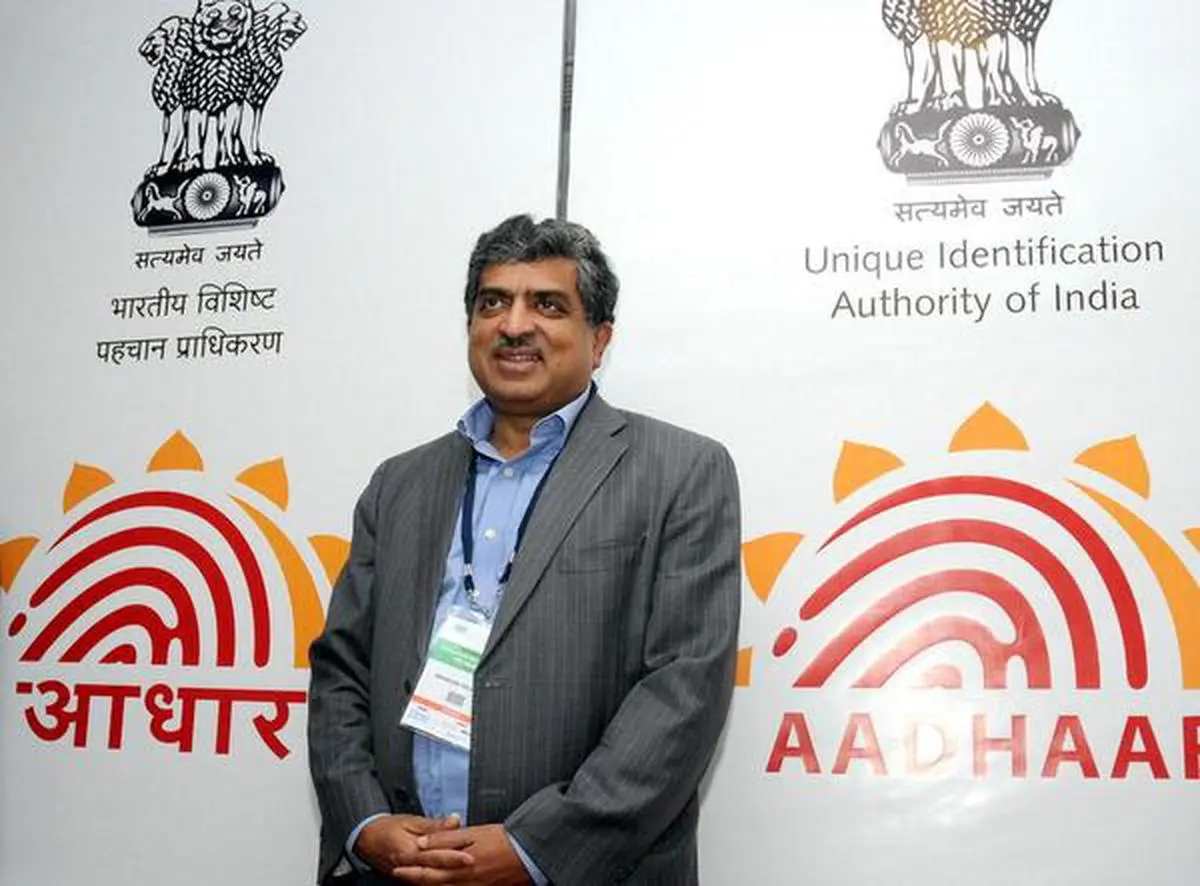
Beyond welfare delivery, Aadhaar became the backbone of India’s digital economy. It enabled initiatives like the Unified Payments Interface (UPI), which revolutionized digital payments and brought millions into the formal economy. Nilekani described Aadhaar as a “digital highway” that supported innovation across sectors.
However, Aadhaar was not without criticism. Privacy advocates raised concerns about the potential misuse of data, while logistical challenges occasionally excluded beneficiaries from welfare schemes. In 2018, the Supreme Court of India upheld Aadhaar’s constitutionality but imposed limits on its mandatory use. Nilekani acknowledged these issues, emphasizing the need for continuous improvement. “No system of this scale is without challenges,” he said, “but Aadhaar has fundamentally changed how India delivers services.”
Nandan Nilekani’s work has extended far beyond Infosys and Aadhaar. Over the years, he has founded, supported, and advised numerous initiatives that address systemic challenges across education, technology, finance, and governance. Each venture reflects Nilekani’s unwavering focus on using technology and innovation as tools to empower individuals and drive societal change.
EkStep: Transforming Education
In 2015, Nandan and his wife Rohini Nilekani co-founded EkStep, a nonprofit platform aimed at tackling India’s persistent learning crisis. The initiative was driven by alarming statistics: over 250 million children in India lacked basic literacy and numeracy skills. EkStep employs digital learning tools to create personalized educational experiences, focusing on foundational skills in reading, writing, and mathematics.
It’s an ambitious but scalable mission: to create a universal learning platform that educators, parents, and children can access freely. Supported by $10 million in seed funding from the Nilekanis, the platform uses open-source technology to provide content and tools in multiple Indian languages. Its reach has steadily expanded, impacting millions of learners across India.
“We wanted to create something that addressed education gaps at scale, using technology as an enabler,” Nilekani explained. “EkStep isn’t just about tools—it’s about creating access for every child, regardless of their circumstances.”
India Stack: Building Digital Public Infrastructure
Another groundbreaking initiative spearheaded by Nilekani is India Stack, a set of open APIs designed to provide a unified platform for identity verification, financial transactions, and data sharing. By integrating components such as Aadhaar, UPI, and DigiLocker, India Stack has enabled a seamless digital experience for citizens and businesses alike.
India Stack is now regarded as a model for digital public infrastructure worldwide, demonstrating how governments can leverage technology to drive inclusion. For instance, DigiLocker allows citizens to securely store and share official documents, reducing bureaucratic hurdles and increasing efficiency. “India Stack represents the idea of building infrastructure that enables innovation for everyone,” Nilekani said.
Unified Payments Interface (UPI): Revolutionizing Digital Transactions
Nilekani’s role in creating the Unified Payments Interface (UPI) has been transformative for India’s financial ecosystem. UPI, developed under the National Payments Corporation of India (NPCI), allows instant real-time payments between bank accounts via smartphones. By making digital transactions simple, secure, and accessible, UPI has brought millions of unbanked Indians into the formal financial system.
As of 2022, UPI had processed over $1 trillion in annual transactions, cementing its place as a cornerstone of India’s digital economy. Nilekani, who served as an advisor to NPCI during UPI’s development, believes its success stems from its inclusive design. “UPI has leveled the playing field for small businesses and individuals alike,” he noted. “It’s a prime example of how technology can democratize access.”
Adbhut India: Harnessing AI for Public Good
In 2024, Nandan Nilekani launched Adbhut India, an ambitious initiative to develop artificial intelligence (AI) solutions tailored to India’s unique challenges. Recognizing the potential of AI to address systemic issues, Nilekani emphasized the importance of creating inclusive and ethical AI systems.
One of Adbhut India’s primary objectives is building datasets in Indic languages, enabling AI applications to cater to India’s diverse linguistic landscape. Additionally, the initiative explores AI’s role in education, healthcare, and agriculture, aiming to close gaps in access and efficiency. “AI must be designed to empower—not exclude,” Nilekani said.
Supporting Startups and Entrepreneurs
Nandan Nilekani has also become a prominent supporter of India’s startup ecosystem, investing in and advising numerous ventures that align with his vision for inclusive innovation. He has backed companies across sectors such as fintech, healthcare, and education, offering mentorship and strategic guidance to entrepreneurs tackling India’s unique challenges.
For example, Nilekani is a key investor in the digital lending platform Avanti Finance, which provides affordable financial services to underserved communities. Through such investments, he has championed the idea of leveraging technology to drive financial inclusion.
The Social Security Mission
As part of his commitment to social infrastructure, Nandan Nilekani has also worked on developing a framework for India’s social security architecture. In collaboration with various policymakers and organizations, he has contributed to initiatives aimed at providing pension coverage and financial security for informal sector workers.
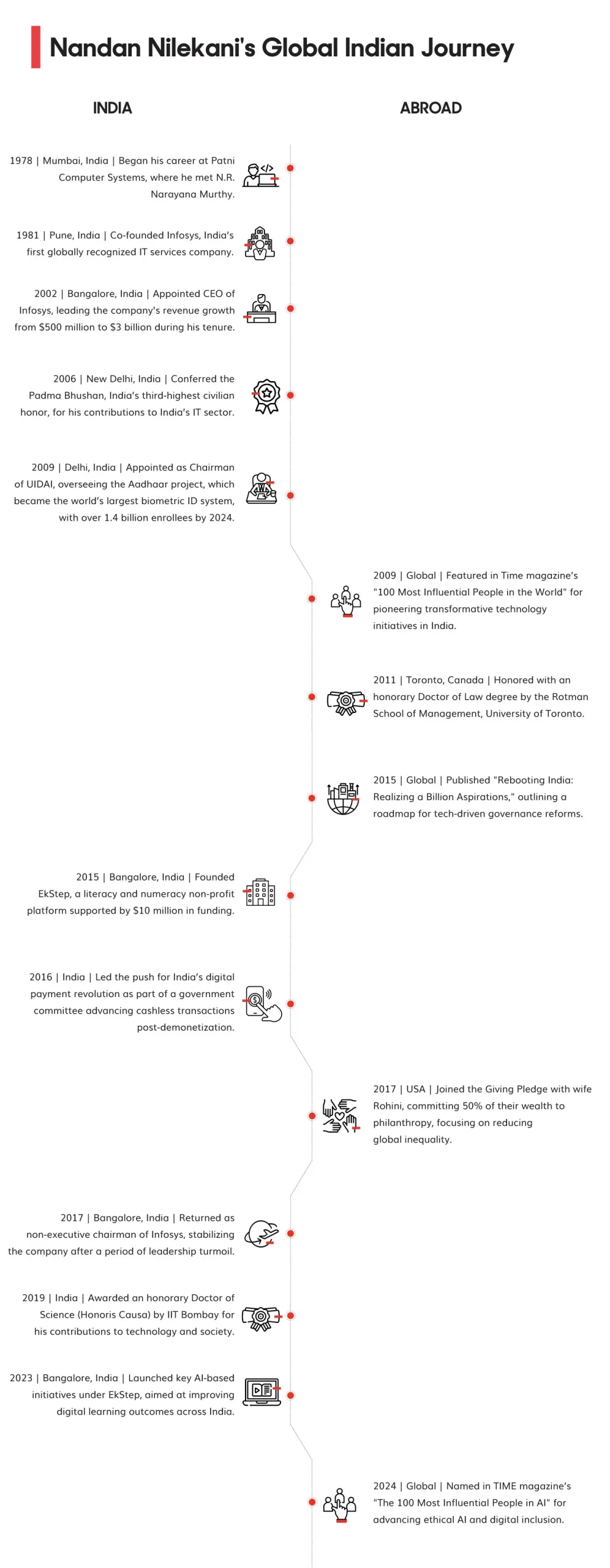
Data Empowerment and Protection
Nilekani’s efforts in advancing data empowerment have been equally significant. He is a vocal advocate for creating systems where individuals retain control over their data, enabling them to leverage it for personal and financial growth. His work in this area has informed India’s Data Empowerment and Protection Architecture (DEPA), which seeks to balance innovation with privacy.
“We live in a world where data is power,” Nilekani said. “The challenge is to ensure that this power rests with individuals, not corporations or governments.”
Giving Back: A Lifelong Commitment
Philanthropy has been central to Nilekani’s journey. In 2017, he and his wife Rohini joined The Giving Pledge, committing to donate at least half their wealth to social causes. Their initiatives span education, urban governance, water conservation, and climate resilience.
The couple’s approach to philanthropy reflects a blend of grassroots support and systemic reform. While Rohini focuses on advocacy, Nilekani concentrates on leveraging technology to solve complex problems.
“Philanthropy is about building platforms that endure,” Nilekani said. “It’s about solving problems at scale, not just addressing symptoms.”
Awards and Recognition
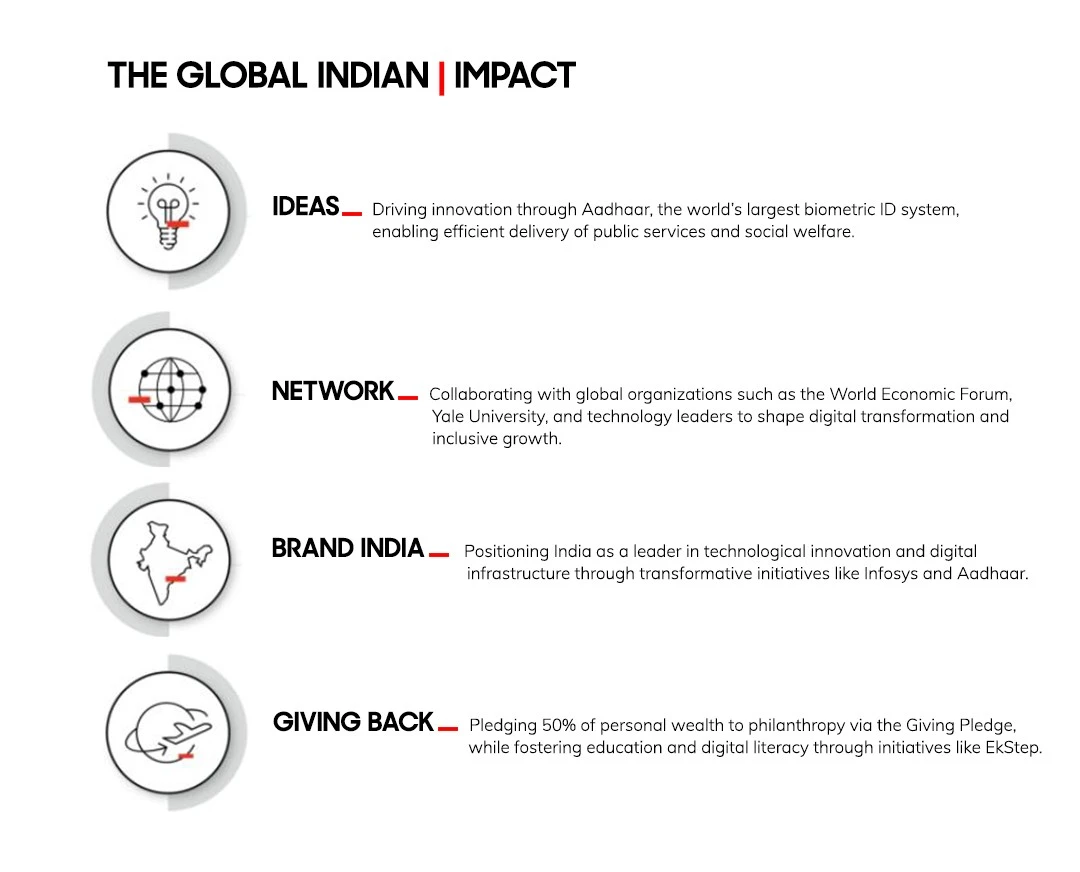
Nilekani’s contributions have earned him widespread recognition. He was named among TIME magazine’s 100 Most Influential People in the World in 2006 and among the 100 Most Influential People in AI in 2024. In 2017, he received the Economic Times Lifetime Achievement Award for his transformative impact on India’s economy and society.
His influence extends beyond accolades. Nilekani’s work has fundamentally reshaped India’s technological and economic landscape, empowering millions and setting global benchmarks for innovation.





